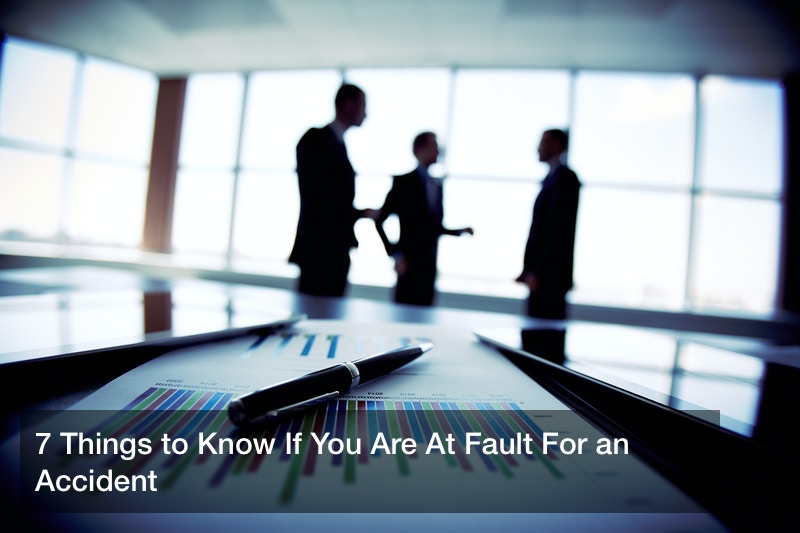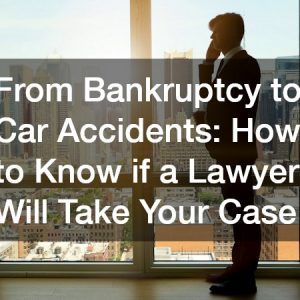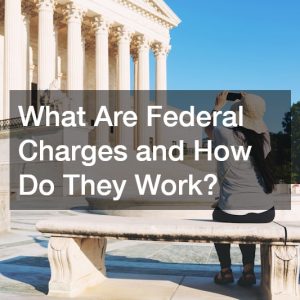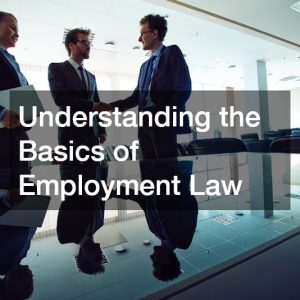
Unfortunately, accidents happen. Sometimes those accidents are our fault, too. We may be doing our best but still make an honest mistake and end up in an accident that involves other people and other vehicles. This can leave us in a very difficult and scary situation.
If you find yourself the at-fault driver in an automobile accident, don’t panic. This can be an overwhelming situation that causes you a lot of stress and worry. However, if you are calm and know your options, you can come out of this better than if you panic about your situation.
Even when you are the at-fault driver, you do still have rights and options. The Eighth Amendment states that any criminal defendant has the right to reasonable bail and the right to avoid cruel and unusual punishment. If you get a good lawyer, they can help you navigate the other troubles you may face as an at-fault driver.
When you are at-fault, you need to think about your legal and monetary situation, as well as any damage to vehicles or injuries to people. This is a lot to think about right after an accident. To help, here are 7 things you should think about when you are the at-fault driver in an accident.
1. What Happens in Court?
In some cases, you might have to go to court because of an accident. This isn’t a happy situation, but it is not always the end of the world, either. Many court cases are not the dramatic things we see on television or in movies. Many are just a formality so that you know what kind of penalties you face.
What happens in court and how the situation resolves is up to you from the moment of the accident. While there are some things that will be out of your hands, there are things you can do to make the situation better or worse right from the moment of the accident.
First of all, if you are involved in an accident and are the at-fault driver you need to stay at the scene of the accident. It may be tempting to leave, but that will have long-term ramifications for you. If you can stay calm and remain at the scene you will save yourself a lot of grief. Fleeing the scene of the accident is something that will come up later in court and could land you with some extremely heavy penalties.

Even when you are the at-fault driver, it is important you contact the authorities after an accident. You don’t know if anyone is hurt. That isn’t a determination you should make yourself or guess about.
Try to stay calm and contact the authorities so they can make sure everyone is safe. Physical safety is still the most important factor, even in a bad situation like this. Plus, your positive and responsible actions now could weigh favorably on you later if you need to go to court over this.
You also might reduce your odds of going to court by doing the right things now. Perhaps no one is hurt. Perhaps it’s not as bad as it initially seems. If that is the case, you might be able to resolve things here and now without the need to go to court later. However, you will only know that by staying calm and remaining on the scene after the accident.
2. What if You Need Bail?
If you go to court, there is a possibility you will be detained. This isn’t a happy outcome, but it’s one you should consider before it comes to pass. Again, being calm and prepared will yield a better result than if you panic.
If you are detained it may not be for long. It is possible you will be able to leave quickly on bail. That requires you or a loved one to get in touch with bail agents though.
Bail has some negative connotations, but it’s actually a system that is meant to help defendants such as an at-fault driver in an accident. No one wants to stay detained if they can get out and bail is the means of getting out.
When you post bail, the court collects money in exchange for letting you out. That money is meant to ensure you will return for all your scheduled court appearances so you can recover the bail.
You should be aware, however, that just going to court won’t mean you get all your bail back. If you go through a bail bondsman or agency then you will have to pay them a fee that you won’t get back.
3. Repairing the Vehicle
Those are two of the most dire situations. However, there are many other concerns to keep in mind when you are the at-fault driver in an accident.
For example, your vehicle could suffer significant damage as a result of the accident. You might need to get auto collision repair, which can be pricey depending on how bad the damage is. Many of us depend on our cars, though, meaning we’ll want to get those repairs as quickly as we possibly can.

You also might have to consider the damages to the other vehicle or vehicles. When you are the at-fault driver, you may be on the hook for the cost of those repairs, either up front or later through insurance claims.
The trouble with other vehicles is that they will have auto parts that are very different from your own car’s. This could mean that some parts are costlier than they are for you car or that you are unfamiliar with the vehicle and aren’t sure how much repairs cost.
If you can, it’s a good idea to do a little research into the other car or cars involved. That will let you feel empowered when the other driver proposes what it will cost to fix the damage caused by the accident.
4. What About Trucks?
Not every vehicle on the road is a car. There are a lot of trucks out there and they end up in accidents too.
Trucks don’t just mean semi-trucks. Things like large SUVs are also considered trucks. There are also moving vans and similar vehicles, all of which are large and heavy and therefore carry other considerations when involved in an accident.
Semi truck accidents have the potential to be the most severe, since those vehicles are so large. They can have difficulty maneuvering through places like cities, which can result in an accident where the at-fault driver is the truck driver.
When a truck driver is at-fault that can be complicated because they are often working for a company while they’re driving. If this is the case for you, you should immediately contact your employer. They are going to find out about the accident one way or the other. It will be better if you notify them yourself and quickly so that they can get in touch with the insurance agency.
However, many of the things that are true for cars are also true for trucks. When you are the at-fault driver and you’re driving a truck you should still stay calm, remain at the scene, and contact the authorities. Those things hold true regardless of the type of vehicle involved.
5. Taking Care of Injuries
The most important thing in any accident is to ensure the physical safety of everyone involved. That means yourself as well as the other driver.
An accident can result in severe injuries, both immediately and in the long term. A lot of people will walk away from an accident thinking they’re OK, only to discover later that they have lasting pain in their neck or back.

You definitely want to avoid these unfortunate circumstances, especially if you are the at-fault driver. You will want to document everything you can at the scene. This includes injuries. If the other driver says they’re OK or only have minor injuries, definitely find a way to document that. You don’t want them to change their tune later on and put you on the hook for hospital bills for major injuries.
Even if the injuries are major, you should find a way to document that. EMTs might be on the scene and able to confirm certain injuries. That will help you figure out how to take care of a fracture or break or any other type of severe injury caused by the accident.
There also could be psychological ramifications from an accident. Sometimes people will try to get the at-fault driver to cover psychiatric care as well as the cost to repair physical injuries. You should be on the lookout for that so that you know what your liability is in that situation.
A personal injury law firm should have experts on hand who can sort out these kinds of details and let you know what kind of outcome you are likely to get. However, we will discuss lawyers in more detail below.
6. Dealing With Insurance
One of the most complicated aspects of being the at-fault driver in an accident is dealing with insurance. These means health insurance as well as auto insurance.
When it comes to auto insurance, one thing people tend to worry about after an accident is their rates going up. Unfortunately, if you are the at-fault driver it is likely your rate will indeed increase.
However, it is not hopeless. Many insurance policies include “accident forgiveness” that will bring your rate back down after you’ve gone a certain amount of time without another at-fault accident.
Regardless, you should still contact your insurance company right after the accident. The other driver will report the accident and there will be a police report so you aren’t going to manage to hide the accident from your auto insurer.
If you are concerned about your auto insurance, it’s a good idea to check out the fine print before an accident ever happens. If you can, figure out ahead of time whether you have things like accident forgiveness in your policy. Of course, you can’t plan to be the at-fault driver in an accident, but if you have this knowledge now you can be a little less worried if the worst does come to pass at some point.
There is also health insurance to consider. If you have injuries, you will be relying on that insurance to help you cover the costs. Hopefully, it isn’t the case that someone needs to go to the hospital, but if that’s the case you will probably hear from your health insurance provider about it.

Again, it’s a good idea to review your policy before anything bad happens so that you know your rights and what to expect if you end up needing to go to the hospital after an accident.
7. Taking to Lawyers
We can’t talk about being the at-fault driver in an accident without mentioning legal concerns surrounding accidents. Depending on the severity of the accident and the potential ramifications, there are different sorts of lawyers that will be best to contact after the incident.
If it is an accident that mostly results in harm to the vehicles, you might want to talk to an auto injury lawyer. This type of lawyer is still concerned about injuries to people, of course, but might also be able to help you with things like your auto insurance and how to handle the other driver’s claims related to damage to their vehicle.
You also might need to talk to a personal injury lawyer if there are severe injuries that result from the accident. If you and/or the other driver is hurt, you might find yourself on the hook for some hefty medical bills. You don’t want to face those alone while still trying to recover and fix your car on top of that.
A lawyer can help you navigate things like insurance claims and hospital bills when those come in. The sooner you can get in touch with a lawyer the better, too. As mentioned above, you want to document the scene as well as you can, and that includes injuries. This will help your lawyer later one when they are trying to make your case.
Finally, if you have to go to court due to the incident, you certainly want a lawyer on your side. Even when you are the at-fault driver in an accident, you still have rights and you still deserve fair representation so you can get the best outcome possible. Trying to deal with this all on your own is likely to result in more hardship for you in the long run.




